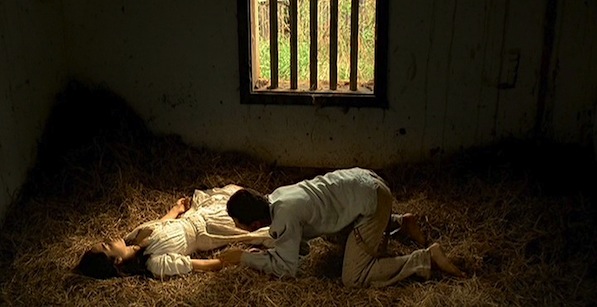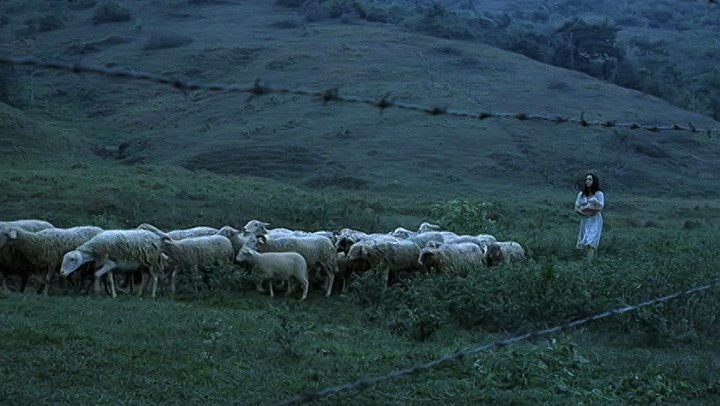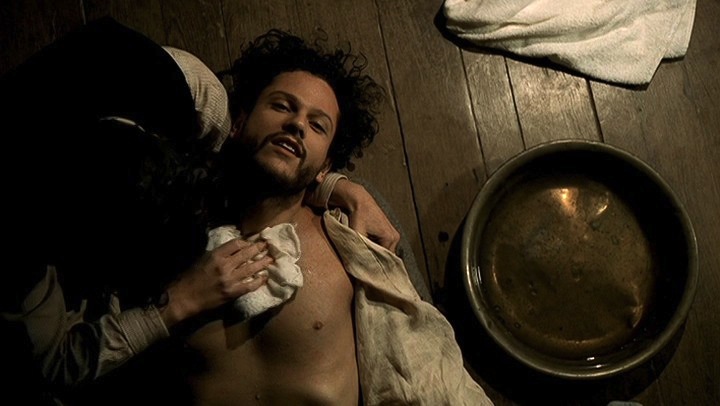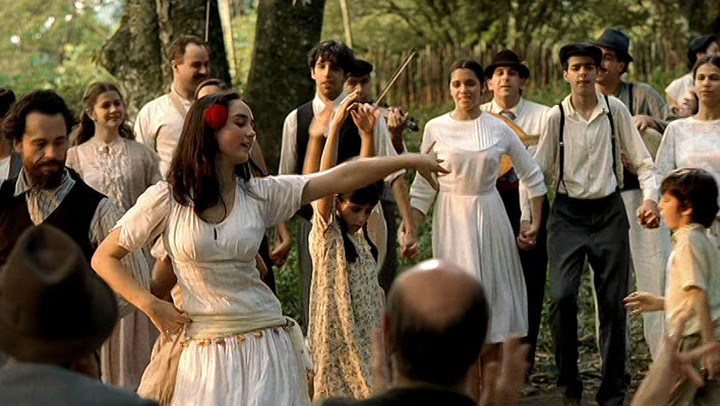Mythic time attempts to depict human action from a nonhuman-centered position. In so doing, it tends to rely on a sense of slowness. Of course, commonplace depictions of the Greek gods and goddesses emphasize their sword-swinging mythos, an approach befitting a society that regarded selfhood as fundamentally action-oriented. But speaking more generally, mythic time, as reflected in filmmakers as otherwise divergent as Andrei Tarkovsky, Stanley Kubrick, Carl Theodor Dreyer, Apichatpong Weerasethakul and Andrey Zvyagintsev, asks us to look beyond the specificity of the individuals onscreen. They are representatives of a higher order, of trans-historical and trans-individual structures that the artists locate within the species.
This doesn’t mean that the films can’t also contain concrete history. But typically filmmakers encourage mythic thinking through abstraction, and this can very often entail the crafting of a contemplative atmosphere. Viktor Shklovsky famously said the purpose of art was to “make the stone stony,” to make things visible in their essential being. Deleuze, for his part, talked about the “time-image” in modern cinema, as a way to make time timey, to allow it to be seen as an essential, material entity. By being with an expanse of time in film, we are asked to experience Time in a more fundamental, even archetypal way.
Slow films can, paradoxically, concentrate our attention of the physical world in order to envelop us in a kind of transcendence of that world. The earth and sky in a film like Tarkovsky’s Stalker, for example, are depicted in such a way as to represent the Elements. The slow trudge of two men in Béla Tarr’s Werckmeister Harmonies is not about getting somewhere; it is the very essence of Human Effort. This orchestration of essences is the space where the mythic in cinema can thrive.
All of the above is a prologue to our consideration of a very unusual film from Brazil, Luiz Fernando Carvalho’s To the Left of the Father from 2001. It is a little bit shorter than some of the other cinematic works we’ve considered in this column (only 171 minutes). It is, for the most part, an intimate family drama, focusing on the rupture caused by the departure of André (Selton Mello), the second son in a traditional Lebanese-Brazilian farming clan. However, there is an outsize mythic expansiveness and broad, expressionist approach to Father that seems to expand the film well beyond its circumstances.
It’s not that Carvalho’s film “feels longer” than 171 minutes. In fact, one of the things that makes To the Left of the Father seem so sui generis is its pacing and editing. Carvalho has made a film that is mythic in all senses. The conflict between André and his family, particularly the family patriarch (Raul Cortez), is played out on the scale of an epic Freudian battle, between nihilism and piety, modernity and tradition, the superego and the id. The two men are barely characters at all. The camera pans slowly over André’s anguished face, over wet leaves, skin, empty rooms—all in the name of atmosphere, creating objective correlatives to André’s repressed desire and despair.
But Carvalho never spends too much time on these contemplative mood shots. Instead, there is an insistence on fidgety cross-cutting and fragmented space, all producing a sense of pace and organization that frequently feels like series television. This is not altogether surprising. Carvalho is a major figure in Brazilian TV, having been at the forefront of artistic miniseries television (primarily working for the Globo network) for two decades. In fact, To the Left of the Father is Carvalho’s only theatrical feature to date. Nevertheless, its expansive approach and unreserved inhibition within the mythic mode marks it as a panoramic work of Big Cinema. Carvalho creates a fully enclosed universe in which the family is the arena of Biblical contestation over wayward souls and threatened sanity, ascension and fall.
Carvalho’s achievement, in some sense, is one of perversity. To the Left of the Father, with its painterly distortions and writhing, anguished Holy Family, often feels very much like a strange synthesis of Alexander Sokurov (Mother and Son, Alexandra) and a Spanish-language telenovela. This is not altogether unfitting, since the father represents the classical values of simplicity and rigor one finds in the Russian master’s films, and the rebellious, possibly mentally ill André embodies the human passions unleashed. Carvalho’s trick, however, is that no synthesis, narrative or formal, is ever achieved. The mythic suggestion of otherworldly time continually collides with a more restless, impatient film grammar, resulting in a film that hovers like grace and then erupts in violent, even ecstatic convulsions. To the Left of the Father remains, to the bitter end, a film at war with itself.







